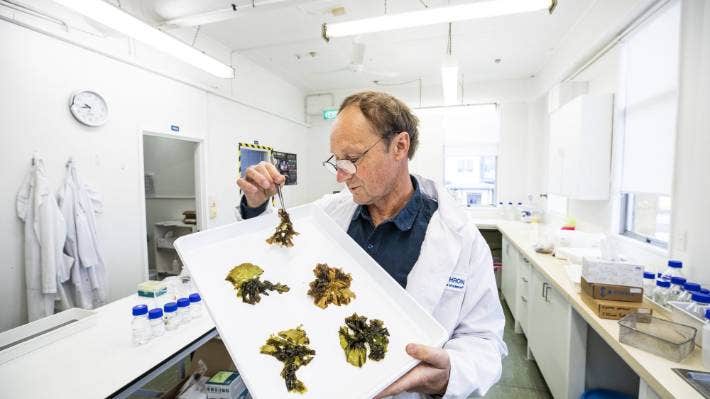Native red seaweed, Karengo, poised to become NZ’s next big food and export success
06 August 2025
New Zealand’s native karengo seaweed could soon rival Mānuka honey as a health-promoting super-food, thanks to new research unlocking its potential as a high-value food and health product.
Cawthron Institute recently received a new tranche of Catalyst: Strategic funding to advance its ground-breaking research into karengo (Porphyra and Pyropia species), native red seaweeds long valued by Māori and now tipped to drive a new era of seaweed farming, food innovation, and regional economic development. The programme is a collaboration among several of New Zealand’s leading research institutes as well as the Singapore Institute for Food Biotechnology Innovation.

Image: Dr Tom Wheeler with seaweed samples in Cawthron Institute’s Whakatū Nelson laboratories.
The new funding builds on previous work supported through the High-Value Nutrition National Science Challenge and a previous Catalyst: Strategic project, which laid the foundation for understanding the nutritional profile of karengo and any health-promoting compounds it contains. The programme also complements a recently awarded Vision Mātauranga Capability Fund project with Te Rūnanga o Kaikōura to collate traditional knowledge and establish community-based ecological monitoring of karengo.
“Karengo is more than just a traditional food — it’s a taonga with incredible scientific, commercial, and cultural value,” says Dr Tom Wheeler, Cawthron scientist and programme leader.
“We’re now combining cutting-edge food processing and food functionality science with food innovation to create novel, high-value products based on algae for global markets.”
The new Catalyst-funded research will focus on four key areas:
- Zero waste bioprocessing: Developing a range of high-value ingredients through processing of karengo biomass
- Process stream characterization: Demonstrating compositional, physicochemical and bioactivity attributes of karengo processing streams
- Demonstrating health-promoting attributes: Undertaking a dietary intervention study to evaluate effects on cardiovascular and digestive health
- Path to Market: Undertaking market opportunity mapping and techno-economic modelling to determine the best routes to market.
The programme brings together a multidisciplinary team of researchers from Cawthron Institute, The New Zealand Institute for Bioeconomy Science, Malaghan Institute of Medical Research, and the Ferrier Institute, as well as food industry and stakeholder partners including Ideas2Plate Ltd, ACS Consulting, Te Rūnanga o Ngāi Tahu, Awarua Rūnaka, and food ingredients company Pacific Harvest who will help to co-develop the research and future commercial pathways.
Their combined expertise spans seaweed science, immunology, food science, food marketing and the indigenous cultural perspective — all essential to building a successful and sustainable karengo value chain.
Cawthron Chief Executive Volker Kuntzsch says the project exemplifies the potential of marine bioresources to fuel sustainable growth in New Zealand.
“This is about building a high-value industry from the ground up, with iwi partners, scientists, and entrepreneurs working together. It aligns with our national goals for export growth, innovation, and environmental stewardship.”
The research is expected to unlock new market opportunities in functional foods, nutraceuticals, and sustainable aquaculture — and position karengo as a uniquely New Zealand addition to the global seaweed economy, currently worth over US$19 billion.